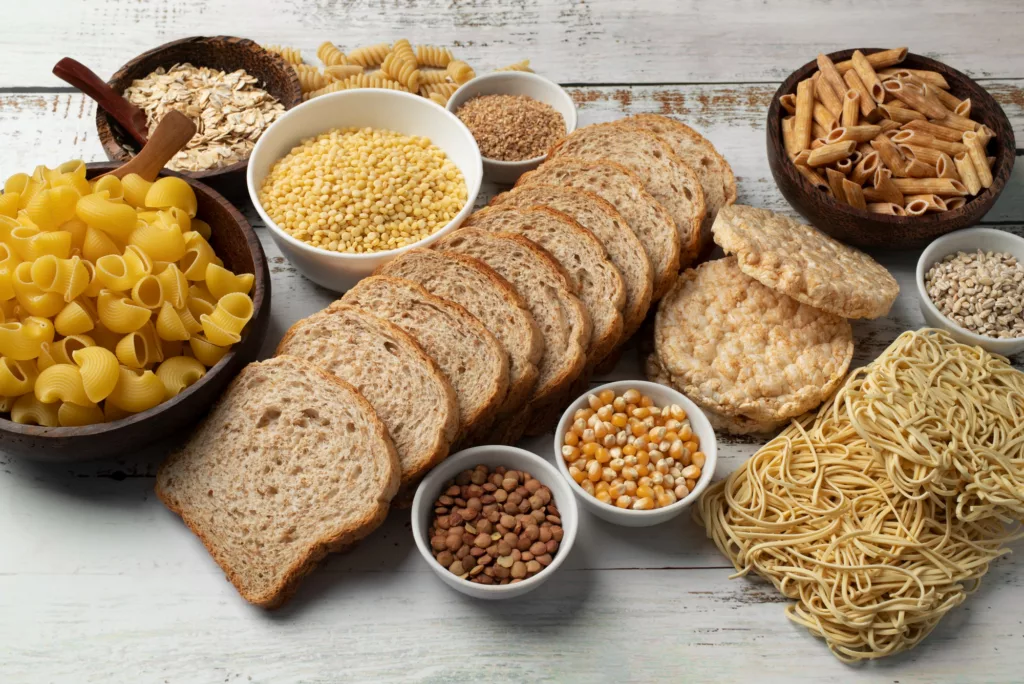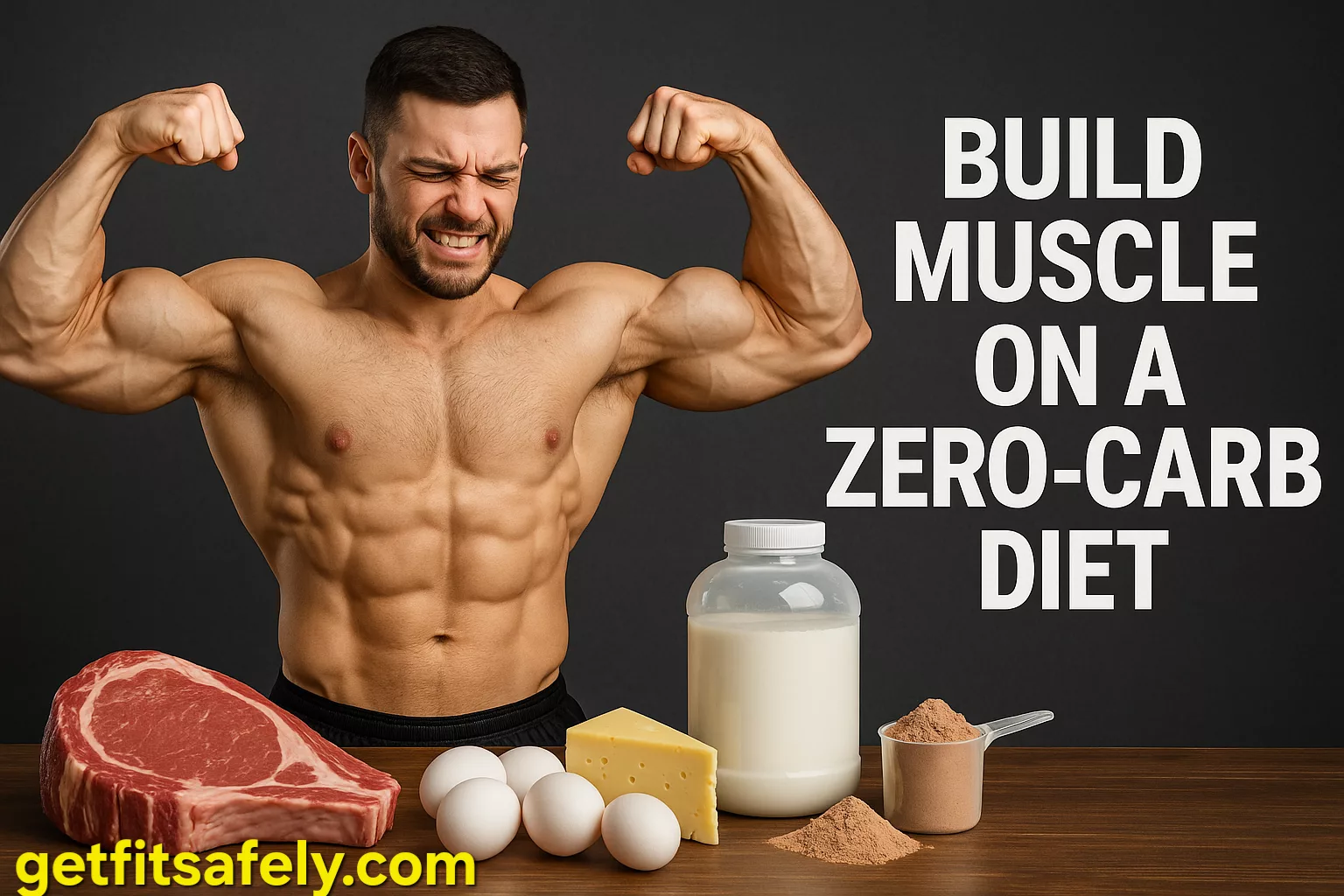Let me tell you straight: when I first heard someone say, “I train like a beast eating only meat and eggs,” I thought he was joking.
Then I saw him lift more than me… and I stopped laughing.
The zero-carb carnivore diet is one of those trends that at first looks like a social media stunt.
People eating only steak, organ meats, and animal fat, glaring at broccoli, and taking selfies with ribs like they were Olympic medals.
But the question remains:
Can you actually build muscle eating only meat?
Or is it just another locker room fairy tale shared between bench press sets?
Carbs: The Old Flame of Bodybuilding

Let’s start with the good old carbs.
They’ve been the literal bread of bodybuilding for decades.
- They fill your muscles with glycogen
- They give you the pump during workouts
- They spike insulin, which is an anabolic hormone
- They make you feel like Hulk when bulking
- And most importantly… they provide massive energy
So the natural thought is:
If I cut carbs, I’ll fade like a lightbulb in a basement.
But that’s not what happens.
The Dark Side of Steak: What Happens When You Cut Carbs

On the carnivore diet, carbs disappear completely.
No pasta, no rice, no fruit, no veggies.
Just meat, fish, eggs, organ meats, lard, butter, salt, and water.
Sounds like a werewolf’s meal plan.
And yet… many report feeling better. More energy. Less bloating. Zero inflammation. And most importantly—muscles still growing.
How is that even possible?
Gluconeogenesis: The Metabolic Magic Keeping You Alive
Here’s the trick.
The body isn’t stupid.
When carbs are missing, it starts producing glucose from proteins and fats.
This process is called gluconeogenesis, and it’s a kind of natural backup system: no sugars?
We’ll make them from other stuff.
Not only that.
After a while, the body adapts and starts using ketones (derived from fats) as the primary energy source.
It’s like switching from a gas car to diesel: the engine still runs, just on different fuel.
And for some… it runs even better.
Muscle Gains and Zero Carbs: Can It Work? Depends on Your Training
Here’s where a key distinction comes in.
What kind of training do you do?
- If you’re into high volume, lots of reps, supersets, intensity techniques, and bloodshot eyes… you might miss muscle glycogen
- But if you train with heavy weights, low reps, long rest periods… performance might stay solid
My Personal Experience: 6 Weeks Carnivore, Zero Regrets
I actually did it.
6 weeks without a single grain of rice.
Zero oats. Zero banana.
Just meat, eggs, butter, organ meats, and gallons of water.
And no, I didn’t die.
Actually:
- Strength went up (especially on squats and deadlifts)
- More mental clarity
- Zero bloating
- Excellent recovery
What did I lose?
The pump during high-volume workouts.
But I gained regularity, mental clarity, and… let’s be honest: I felt like a lion.
The Upside: Quality Proteins and Fats, No Distractions
With the carnivore diet, junk food temptation doesn’t exist.
- No “just one” cookie that turns into ten
- No cheat meals wrecking your gut
- No endless tracking of fiber intake
Just meat. And fat.
And tons of high-quality protein.
Every meal is a bomb of essential amino acids.
Add liver, heart, egg yolks, sardines, and you’ve got a natural stack of iron, zinc, vitamin A, choline, and B12.
The perfect combo for protein synthesis, hormone health, and overall vitality.
Side Effects? Oh Yes, There Are Some
I’m not selling dreams here.
Zero-carb isn’t for everyone.
- Some people crash in the first few days (the infamous “keto flu”)
- Others get constipated (no fiber—it’s a challenge)
- Some lose the pump, the endurance, and even their mood
- And let’s be honest—eating only meat can get boring
There are days when you look at a zucchini like you once looked at cheesecake.
Dining out? Becomes a diplomatic negotiation with the waiter:
“Just the steak. No sides. No bread. No sauce. Just meat. Thanks.”
So Can You Build Muscle Without Carbs?
Yes, you can.
But don’t expect miracles overnight.
You need adaptation, consistency, and a training style that fits.
On a meat-only diet:
- You’ll have fewer energy crashes
- You’ll recover well (especially if you sleep properly)
- You’ll deal with less systemic inflammation
- And you can still grow, as long as you eat enough
The key is this: don’t underestimate your calorie needs.
Just because rice is gone doesn’t mean you can live on chicken breast.
Eat fat. Eat organ meats. Eat smart.
How to Structure Meals on a Carnivore Diet for Muscle Growth
One of the most common mistakes people make when switching to carnivore and trying to grow is under-eating.
With no carbs, appetite can drop, and animal foods are very satiating.
To bulk up, you need a strategy:
- Breakfast: whole eggs, fatty ground beef, ghee
- Lunch: ribeye steak + liver or heart + bone broth
- Dinner: wild salmon or lamb + raw yolks + tallow
Avoid eating only lean steaks. You need a good dose of animal fat to hit your calorie targets.
A useful rule:
2g of protein per kg of body weight + enough fat to hit a calorie surplus.
What to Expect in the First 2 Weeks (Adaptation Phase)
The first few days can be rough. The body switches from glucose to ketones as the main fuel.
Here’s what you might feel:
- Headaches
- Temporary weakness
- Mild nausea
- Irritability
- Different sweat smell (stronger odor)
This phase is called “keto flu,” and it passes in a few days if you get your electrolytes right:
- Pink salt (sodium)
- Mineral water high in magnesium
- Bone broth (potassium + collagen)
Once you get through it, energy stabilizes, sleep improves, and mental clarity rises.
Can You Do a “Clean Bulk” on Carnivore?
Absolutely, and that’s one of its strengths.
Many athletes use it to build lean mass while minimizing fat gain.
Why?
- It’s almost impossible to spike insulin too much
- Meals are naturally satiating
- Emotional eating disappears (zero sugar = fewer cravings)
- Insulin sensitivity improves
You won’t get the epic carb-fueled pumps, but you may gain less fat and stay leaner through your bulk phase.
Strategies to Reintroduce Carbs (If Needed) Without Losing Benefits
Not everyone needs to stay 100% carnivore forever.
If you notice performance drops or want to regain volume, you can reintroduce small, targeted carb sources:
- Carb backloading: only at dinner and post-workout
- Weekly cycles: 5 carnivore days + 2 refeed days (with potatoes, rice, cooked fruit)
- Targeted training: carb refuels only on leg or back days
This way you keep the hormonal and digestive control of carnivore, with a boost for high-volume sessions.
Other Benefits of Zero-Carb Carnivore (Besides Muscle)
If you think carnivore is just for gains… you’re missing half the picture.
There are extra benefits many discover only by trying it:
- Cleaner digestion: no fermentation, bloating, or reflux
- Steady mental energy: no sugar crashes, no brain fog—yes, we said it, but it’s real
- Clearer skin: many rashes, acne, and flare-ups vanish in 2 weeks
- Mood stability: no sugar spikes = more emotional balance
- Less joint pain: cutting inflammatory foods helps chronic pain
- Appetite control: we mentioned this earlier, but it’s worth repeating—when meals are actually satisfying, the urge to snack or binge fades fast.
And if you’re someone who gains fat just by looking at a cookie…
The carnivore diet is a body recomposition weapon.
Less fat, more lean tissue. Without tracking macros every five minutes.
Are There Serious Professionals Who Follow or Recommend Carnivore?
Yes—and they’re not just TikTok bros in underwear.
There are doctors, athletes, powerlifters, sports nutritionists, and biohackers who follow or recommend carnivore either cyclically or long-term.
Real-life examples:
- Dr. Shawn Baker – orthopedic surgeon, master athlete, and one of the best-known faces of the carnivore movement. Lifts heavy and eats only meat for years
- Paul Saladino (MD) – former functional medicine doc who developed a nose-to-tail carnivore approach with great results
- Zach Bitter – ultramarathon runner who cycles carnivore or low-carb phases during intense training
In the strength and bodybuilding world, several natural athletes use carnivore for cutting or metabolic maintenance.
It’s also common to find sports dietitians recommending 4-8 week carnivore blocks to reduce inflammation, food allergies, and improve eating behavior.
RELATED:》》》 How bad is it to eat fast food every day if I hit my protein macros for muscle growth?
Conclusion: Meat, Yes—But With a Brain. And Clear Goals.
Yes, it’s extreme. But it can work, if you know what you’re doing.
If your goal is to grow clean, without hunger swings, fast digestion, and zero junk food:
It can be a winning strategy.
But it’s not for everyone.
If your training relies on glycogen and volume, you might miss it.
FAQs
Is a zero-carb carnivore diet ketogenic?
Yes… and no.
It’s ketogenic by definition, because removing carbs pushes your body into ketosis: it starts using ketones and fat for fuel.
But it’s not your classic keto diet:
- No vegetables or vegetable oils
- Focus is on animal protein, organ meats, and natural fats (tallow, butter, lard)
- No macro-counting to “stay in ketosis” — it happens naturally
Basically: it’s a more extreme, simpler form of keto.
No avocado, no almonds, no salads. Just animals.
Is eating meat every day unhealthy?
Depends on what kind of meat and what else you’re eating.
If you live on cheap hot dogs and processed burgers, yes—it could be a problem.
But if you eat quality meats, natural fats, and nutrient-dense organs, then no—it’s not unhealthy.
In fact, many people improve gut health, lower inflammation markers, balance blood sugar, and get stronger by eating only animal foods.
The key is variety within the animal kingdom:
- Muscle meat (steaks, chicken, lamb, duck)
- Organs (liver, kidneys, heart)
- Fatty fish
- Whole eggs
- Animal fat (tallow, butter)
If you balance it well, not only is it not harmful… it might be one of the most nutrient-dense diets out there.

